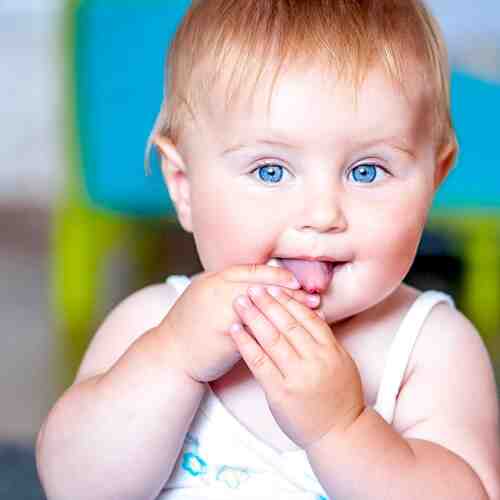The Connection Between Teething and Sleep Troubles
For both babies and parents, teething can be a challenging phase in a child’s development. As babies begin to grow their first set of teeth, they often experience discomfort, which can significantly affect their overall mood, behavior, and, most notably, their sleep. Teething and sleep troubles go hand in hand, as the pain and discomfort associated with this natural milestone can disrupt a baby’s sleep patterns and make it difficult for both the baby and the parents to get a restful night’s sleep. Understanding the connection between teething and sleep troubles can help parents manage the situation better and find ways to soothe their baby to sleep during this challenging time.
Why Does Teething Cause Sleep Problems?
Teething is the process during which a baby’s primary teeth break through the gums. This can start as early as 3 months of age and continue until the child is about 3 years old. While the teething process is natural, it can be uncomfortable for babies, leading to several issues that affect their sleep. Here’s why teething can cause sleep troubles:
- Gum Pain and Swelling As a baby’s teeth begin to emerge, their gums become swollen, inflamed, and sore. This discomfort can make it difficult for babies to fall asleep or stay asleep throughout the night. The throbbing pain from the pressure of the emerging teeth can keep babies awake, tossing and turning in their crib or bed.
- Increased Drooling Drooling is another common symptom of teething. Excess saliva can make babies feel uncomfortable and cause irritation on their chin, neck, or chest. This irritation can lead to restlessness and difficulty falling asleep.
- Disrupted Feeding Patterns Teething pain can sometimes make babies reluctant to eat, as sucking can exacerbate gum pain. For babies who are breastfeeding or bottle-feeding, this can result in disrupted feeding schedules and poor nutrition, which can further affect their sleep patterns.
- Irritability and Fussiness Teething can cause a lot of general discomfort, which often leads to fussiness and irritability. Babies who are uncomfortable may cry more frequently, struggle to settle down, and find it hard to self-soothe, making it harder for them to fall asleep or stay asleep.
- Changes in Sleep Environment As babies teethe, they may experience heightened sensitivity to stimuli like light, sound, or even the temperature of their sleep environment. These sensitivities can interfere with their ability to sleep soundly, leading to more frequent waking and difficulties going back to sleep.
- Night Wakings and Increased Need for Comfort Many babies who are teething experience increased night wakings. The pain may disrupt their deep sleep cycles, causing them to wake up crying. During this time, babies may require more frequent comfort, such as being rocked, held, or nursed, which can affect both their sleep and the sleep of their parents.
Teething vs. Sleep Regression: Understanding the Difference
It’s important to distinguish between teething-related sleep issues and a common phenomenon known as “sleep regression.” Sleep regression usually occurs at specific developmental milestones and can happen at various ages, such as 4 months, 8 months, or 12 months. While sleep regressions are often linked to developmental changes like new skills (e.g., rolling, crawling, or standing), teething can also coincide with these stages.
Sleep regressions and teething may appear similar in terms of disturbed sleep patterns, but the root causes are different. Teething causes discomfort in the gums, leading to pain, while sleep regressions are typically tied to changes in your baby’s growth and cognitive development. It’s possible for both to occur at the same time, which can make it even more difficult for parents to discern the cause of their baby’s sleep troubles.
How Long Do Teething Sleep Troubles Last?
The duration of sleep issues related to teething varies from baby to baby. For some babies, teething may cause temporary sleep disturbances lasting only a few days or weeks. For others, especially during the eruption of the molars (the larger back teeth), the discomfort can last for several months.
Typically, the worst of the teething pain occurs when the first few teeth emerge. However, the process continues as more teeth come in over time. The pain associated with molars (the big teeth at the back) can be particularly troublesome and may result in more extended periods of sleep disruption.
How to Help Your Teething Baby Sleep Better
Although teething-related sleep troubles can be difficult for both the baby and parents, there are several methods you can use to soothe your baby and encourage better sleep during this challenging time. Here are some strategies:
1. Create a Soothing Bedtime Routine
A consistent bedtime routine can help your baby feel secure and relaxed, making it easier for them to fall asleep despite their teething pain. Incorporate calming activities such as:
- A warm bath
- Gentle massage
- Soft lullabies or white noise
- Dim lights
A predictable routine signals to your baby that it’s time to sleep, helping them settle down even when they’re experiencing discomfort.
2. Use a Cold Teething Toy
A chilled teething ring or toy can provide soothing relief for sore gums. The coldness helps numb the pain, making it easier for your baby to fall asleep. Avoid freezing teething toys, as they may become too hard and could cause injury. Just chill the toy in the refrigerator for a short time before giving it to your baby.
3. Gum Massage
If your baby is willing, a gentle gum massage with a clean finger can provide immediate relief. Gently rub your baby’s gums in small, circular motions, focusing on the areas where the teeth are emerging. This will help alleviate some of the discomfort and may calm your baby enough to sleep.
4. Offer Extra Comfort
During teething, your baby may need additional comfort and reassurance. Be prepared for more frequent wake-ups, and respond promptly to your baby’s cries. Sometimes, simply holding your baby or offering a pacifier can provide the comfort they need to fall back asleep.
5. Pain-Relieving Solutions
If your baby is particularly uncomfortable, you might consider using natural pain-relief methods, such as:
- Chilled Washcloth: A cold, damp washcloth can be a soothing option for babies to chew on, providing comfort to sore gums.
- Chamomile Tea: Chamomile has mild soothing properties, and you can apply it to a soft cloth or use a chilled teething toy infused with chamomile.
Always check with your pediatrician before using any form of medication or natural remedies to ensure safety for your baby.
6. Maintain a Comfortable Sleep Environment
A calming and comfortable sleep environment is important for promoting sleep during the teething phase. Keep the room cool, dark, and quiet, and ensure that your baby’s crib or bassinet is free of distractions. A white noise machine can help mask any external noises that might disturb your baby’s sleep.
7. Keep a Consistent Sleep Schedule
Even during teething, try to maintain a consistent sleep schedule. Going to bed at the same time each night and keeping naps consistent will help regulate your baby’s circadian rhythm, making it easier for them to get a full night’s rest.
When to Contact a Pediatrician
While teething can cause sleep disturbances, there are other conditions that can mimic teething symptoms. If your baby is experiencing symptoms like high fever, diarrhea, or a rash, it’s important to consult with your pediatrician, as these could indicate an illness rather than just teething.
Additionally, if your baby’s sleep troubles persist or seem unusually severe, it’s a good idea to talk to your pediatrician for further guidance.
Conclusion
Teething can undoubtedly disrupt your baby’s sleep, but understanding the connection between teething and sleep troubles can help you navigate this challenging time with more ease and patience. By providing comfort and using natural remedies to alleviate teething pain, you can help your baby rest better and ensure that both of you get the sleep you need. With time, teething will pass, and your baby will return to their normal sleep patterns. Until then, a combination of soothing strategies, a consistent bedtime routine, and extra comfort can make all the difference in helping your baby sleep through the discomfort of teething.





